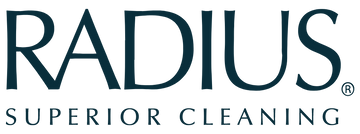
Proper oral hygiene begins as early as infancy. People may think baby teeth don't need much attention because they will eventually fall out, but taking care of your little one’s teeth is as important as taking care of your own. In fact, dental care should start before the first tooth appears.
Having healthy teeth help children to eat properly and speak clearly. It also guides the permanent adult teeth into the proper position. If you want to know more about the basics of your baby’s oral hygiene, here are some things that you need to keep in mind.
CLEAN YOUR BABY’S GUMS AFTER FEEDING

You don’t need to wait for your child's teeth to appear to start a baby oral care routine. Your baby’s gumline needs gentle cleaning, too. After birth, gums should be cleaned after every feeding and before bedtime.
Use RADIUS’ Pure Brush to gently clean your baby’s gums, cheeks, and tongue to prevent bacteria from growing. It is specifically designed for babies so you don’t have to worry about your little one’s tiny mouth because it has a safe and sensitive brush head.
GIVE YOUR INFANT CLEAN TEETHERS

Teething can be difficult for babies. Studies show that teething has been associated with sleep disturbances, drooling, rashes, runny noses, diarrhea, appetite loss, irritability, and slight rises in temperature.
There are many ways to help ease your child’s discomfort when they start teething. But one of the best techniques is to give them teethers. Teething rings or toys are designed to help alleviate some of the pain and make them more comfortable.
START BRUSHING TWICE A DAY
Your baby was born with 20 primary teeth below the gumline. After the teething process, the first set of teeth typically starts to come through between 6 and 12 months. As soon as these teeth appear, decay can occur.

There are countless baby toothbrushes out there, but make sure you're choosing the right one for your child. The Pure Brush is also ADA Accepted and has ultra-soft bristles and a dye-free, tapered handle to help both you and baby brush properly.Your baby was born with 20 primary teeth below the gumline. After the teething process, the first set of teeth typically starts to come through between 6 and 12 months. As soon as these teeth appear, decay can occur.
SCHEDULE AN APPOINTMENT WITH THE DENTIST
 According to the American Academy of Pediatric Dentistry (AAPD), children should have a dental appointment by age one or within six months after the first tooth erupts.
According to the American Academy of Pediatric Dentistry (AAPD), children should have a dental appointment by age one or within six months after the first tooth erupts.
Visiting a dentist will give you an opportunity to ask and learn more about establishing the best oral hygiene for your kids. Early childhood dental visits are very important because the dentist can give advice on how to prevent cavities and tooth decay, and how to develop healthy habits.
USE CHEMICAL-FREE TOOTHPASTE
Aside from a toothbrush, your baby’s oral care kit should include a safe and effective toothpaste. Get only the best for your little one with our USDA Organic Children's Toothpaste that is formulated with 100% clean and safe ingredients.

A pea-sized amount of toothpaste is enough to clean your child’s teeth. Children can be picky when it comes to taste, so allow them to choose what toothpaste flavor they want to enable them to enjoy the process. Our organic toothpaste in Coconut Banana and Dragon Fruit are some of the flavors that you and your kids will surely love.
CHECK YOUR BABY’S TEETH REGULARLY
Get familiar with the appearance of your baby’s teeth and gums. Constant checking will help you notice if something is different right away. Check their mouth regularly and look for white or brown spots which can be an early sign of tooth decay or cavities. If you see these spots, schedule an appointment with your dentist as soon as possible.

